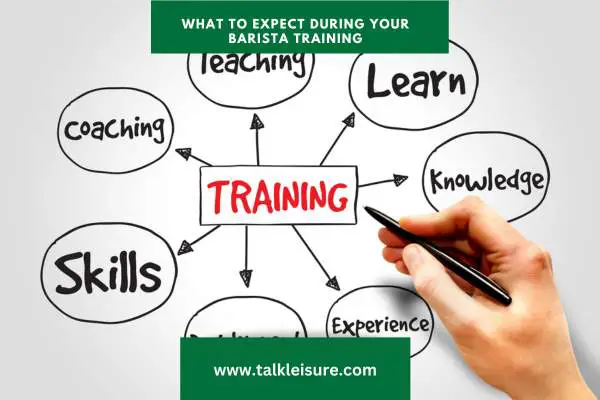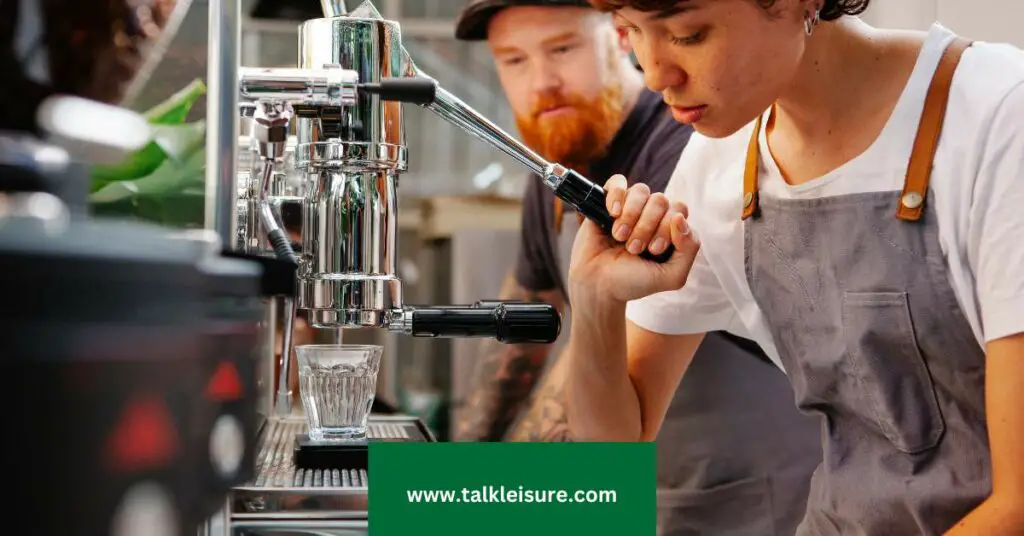If you’re a coffee enthusiast and dream of becoming a barista, you may be wondering how long it takes to become one. The answer is more complex than a specific number of weeks or months, as the length of barista training can vary depending on several factors.
Barista training is a crucial step for anyone aspiring to become a professional coffeemaker. It’s a comprehensive process that teaches the ins and outs of making espresso, steaming milk, and creating latte art.
This training is necessary to ensure consistency in the quality of coffee and service provided to customers.
In this blog post, we’ll dive deeper into the different factors that can influence the length of barista training.
Whether you’re considering a career change or want to improve your coffee-making skills, this post will provide you with valuable insights into the world of barista training.
Types of Barista Training: What’s Available for Aspiring Trainees?

There are several different types of barista training available, each offering a unique approach to learning how to make exceptional coffee.
Here are some of the most common types of barista training:
In-Person Training
In-person training is the most traditional method of barista training. It involves attending classes in a physical location, such as a coffee shop or training center.
In-person training often provides a hands-on experience, allowing students to practice making coffee under the guidance of experienced instructors.
Online Training
Online barista training has become increasingly popular in recent years, allowing students to learn at their own pace from the comfort of their own homes.
Online training typically includes videos, tutorials, and quizzes to help students learn the skills needed to become proficient baristas.
On-the-Job Training
Some coffee shops offer on-the-job training, which involves learning how to make coffee while working at a coffee shop.
This type of training is ideal for those who want to get hands-on experience while getting paid.
Specialty Training
Specialty training is designed for those who want to take their barista skills to the next level. It typically focuses on specific areas of coffee making, such as latte art or cupping.
Specialised training is often more expensive than other types of training but can lead to better job opportunities and higher pay.
No matter which type of training you choose, it’s important to find a reputable program that will provide you with the skills you need to become a successful barista.
Essential Barista Skills: What You Need to Become a Barista

Becoming a skilled barista involves learning a variety of technical and interpersonal skills. Here are some essential skills you’ll need to learn:
Espresso Extraction: The foundation of coffee making, espresso extraction involves grinding beans, tamping the grounds, and using an espresso machine to pull a shot of espresso. A skilled barista should be able to consistently produce shots with the correct level of crema, flavor, and aroma.
Milk Steaming: Steaming milk is a crucial skill for making lattes, cappuccinos, and other milk-based espresso drinks. A barista must learn how to steam milk to the correct temperature and texture to achieve the desired flavor and consistency.
Latte Art: While not essential for making great coffee, latte art can take a drink to the next level and impress customers. A barista should learn how to create basic latte art designs, such as hearts and rosettas, to add a personal touch to their drinks.
Equipment Maintenance: A skilled barista should be able to clean and maintain their equipment properly to ensure it’s working at its best. This includes cleaning and descaling espresso machines, maintaining grinders, and keeping milk frothers clean.
Customer Service: Great customer service is a critical component of being a barista. A skilled barista should be friendly, approachable, and able to communicate effectively with customers. They should also be able to handle customer complaints and provide solutions to any problems that arise.
Time Management: Baristas often work in fast-paced environments, so it’s important to be able to manage time effectively. A skilled barista should be able to multitask, prioritize tasks, and work efficiently under pressure.
By learning these essential barista skills, you’ll be well on your way to becoming a skilled and successful barista.
What to Expect During Your Barista Training: A Journey into the World of Coffee

Barista training typically involves a combination of theory and hands-on practice.
Depending on the program you choose, you may learn about coffee beans, roasting techniques, and brewing methods, as well as the essential skills needed to make great coffee.
During your training, you’ll likely spend time practicing your skills with an espresso machine, a milk frother, and other coffee-making equipment.
You’ll also learn about latte art and how to create a range of coffee drinks, from espresso shots to cappuccinos and beyond.
In addition to technical skills, you’ll also learn about customer service and the importance of creating a welcoming environment for your customers.
You’ll learn how to interact with customers and handle their orders, including customizing drinks to their preferences.
Many barista training programs also offer job placement assistance, helping you find a job at a coffee shop or café once you’ve completed your training.
This can be a valuable resource for those new to the industry or looking to switch careers.
Overall, barista training can be a fun and rewarding experience for those passionate about coffee.
With the right training and dedication, you’ll be well on your way to becoming a skilled barista and making exceptional coffee for customers to enjoy.
How Long Does Barista Training Typically Take: The Time It Takes to Train for the Perfect Brew

The length of barista training can vary depending on the program and the level of expertise you want to achieve.
Generally, basic barista training can be completed in a matter of days or weeks, while more advanced training can take several months.
Some barista training programs offer intensive courses that can be completed in just a few days, covering the basics of espresso extraction, milk frothing, and latte art.
These types of courses are ideal for those who want to learn the essential skills quickly and get started working in a coffee shop as soon as possible.
Other programs offer more comprehensive training that can take several weeks or months to complete.
These programs may cover a wider range of topics, including coffee roasting, cupping, and coffee brewing methods.
They may also include job placement assistance, which can be helpful for those looking to start a career as a barista.
Ultimately, the length of barista training depends on your individual goals and the level of expertise you want to achieve.
If you’re looking to become a skilled and knowledgeable barista, it may be worth investing in a more comprehensive training program that takes several weeks or months to complete.
However, if you’re looking to get started quickly and don’t have a lot of time to spare, a shorter, intensive training program may be a better fit for you.
Barista Training Resources: Where to Find the Best Courses Available

If you’re interested in becoming a barista, there are many resources available to help you get started. Here are a few places where you can find barista training resources:
- Coffee Shops and Cafés: Many coffee shops and cafés offer barista training programs to their employees. If you’re interested in becoming a barista, consider applying for a job at a coffee shop or café that offers training.
- Barista Schools: There are many schools and academies that offer barista training programs, ranging from basic courses to advanced programs. These schools can be a great resource for those looking to learn the technical skills of coffee making and gain a deeper understanding of coffee.
- Online Resources: Many online resources are available for those looking to learn about coffee and barista skills. YouTube, for example, has many tutorials on espresso extraction, milk frothing, and latte art. There are also online courses and webinars that cover various topics related to coffee and barista skills.
- Books and Magazines: There are many books and magazines available on coffee and barista skills that can be a great resource for those looking to learn more. Some popular books on the subject include “The Professional Barista’s Handbook” by Scott Rao and “Coffee Art: Plus Techniques for Enjoyment” by Robert Schinkel.
- Industry Conferences and Events: Attending industry conferences and events can be a great way to learn about new techniques, trends, and technologies in the coffee industry. These events can also be a great opportunity to network with other baristas and coffee professionals.
By utilizing these resources, you can gain the knowledge and skills you need to become a skilled and knowledgeable barista.
Next Steps After Completing Barista Training: Progressing in Your Journey as Every Barista Should

Completing barista training is just the first step in starting your career as a barista.
Once you have completed your training, there are a number of things you can do to take your skills to the next level.
One of the most important things you can do is practice as much as possible.
Find a coffee shop or café that is willing to let you practice your skills and continue to work on perfecting your techniques.
The more you practice, the better you’ll become.
Another way to improve your skills is to attend workshops and competitions.
These events can be a great way to continue learning and developing your skills.
They often feature industry experts who can share their knowledge and help you improve your techniques.
Attending industry events can also help you stay up-to-date on the latest trends and techniques in the coffee industry.
Staying up-to-date on industry trends is another key to success as a barista.
The coffee industry is constantly evolving, so it’s important to stay informed about the latest trends and techniques.
Attend industry conferences and events, read coffee publications, and follow industry leaders on social media to stay informed.
If you’re interested in taking your skills to the next level, consider enrolling in more advanced barista training programs.
These programs can teach you advanced techniques, such as coffee roasting and cupping, and can help you become a coffee industry expert.
Seeking feedback from customers and colleagues can also help you identify areas for improvement and work on becoming a better barista.
In summary, completing barista training is just the beginning of your journey as a barista.
By practicing your skills, attending workshops and competitions, staying up-to-date on industry trends, enrolling in advanced training programs, and seeking feedback, you can continue to develop your skills and become a skilled and knowledgeable barista.
Conclusion

In conclusion, becoming a successful barista requires more than just completing a barista training program.
It requires ongoing dedication, practice, and a commitment to continually improving your skills.
By following the next steps outlined above, you can take your skills to the next level and become a skilled and knowledgeable barista who can create high-quality coffee drinks that your customers will love.
Whether you’re just starting out in the coffee industry or are looking to take your skills to the next level, there are many resources available to help you achieve your goals.
With hard work and dedication, you can become a successful barista and make a positive impact on the coffee industry.
FAQS
Q: How important is practicing my barista skills after completing the training?
A: Practicing is essential to gaining confidence and improving your skills.
Q: Are workshops and competitions necessary after completing barista training?
A: They’re not necessary, but attending can help you learn, improve, and stay updated on industry trends.
Q: Do I need to enroll in advanced barista training programs to become successful?
A: No, it’s not necessary, but it can be helpful if you’re looking to take your skills to the next level. However, dedication, practice, and commitment to improving your skills are essential.
Q: How long does barista training take?
A: The duration of barista training can vary depending on the type of training program. It can range from a few hours for a short course to several weeks for a comprehensive training program.
Q: How long does it take to become a barista?
A: The time it takes to become a barista can vary depending on the individual’s prior experience and dedication to learning. On average, it takes about three to six months to become proficient in basic barista skills.
Q: Can I become a barista through a short course?
A: Yes, it is possible to become a barista through a short course. Short courses can provide you with the basic skills and knowledge required to start working as a barista.
Q: What can I learn in the first three months of barista training?
A: In the first three months of barista training, you can expect to learn the basics of coffee preparation, such as pulling espresso shots, steaming milk, and creating latte art. You will also gain knowledge about different coffee beans, brewing methods, and customer service.
Q: How long does it take to train a new barista?
A: Training a new barista can take anywhere from a few weeks to a few months, depending on the individual’s prior experience and ability to learn. It is important to provide adequate time and support to ensure the new barista becomes proficient in their skills.
Q: Will previous experience in hospitality shorten the barista training time?
A: Previous experience in hospitality can definitely shorten the barista training time. Familiarity with customer service, multitasking, and working in a fast-paced environment can give you a head start in learning the specific skills of a barista.
Q: How long does it take to become a junior barista?
A: Becoming a junior barista typically takes around six to twelve months of training and gaining experience in a coffee shop or café. During this time, you will be able to develop your skills and knowledge under the guidance of more senior baristas.
Q: How long does it take to become a head barista?
A: To become a head barista, you will need to gain experience and expertise in the field. This process can take several years of training and working as a barista. It also involves acquiring leadership skills and the ability to manage a team.
Q: Do experienced baristas need specialized training?
A: Experienced baristas can benefit from specialized training to enhance their skills and knowledge. Specialized training can focus on advanced brewing techniques, understanding different coffee origins, as well as learning about the world of barista competitions.
Q: How long does it take to master the art of coffee making?
A: Mastering the art of coffee making is an ongoing journey that can take years of practice and continuous learning. While basic skills can be acquired within a few months, becoming a great barista who can consistently create exceptional coffee requires dedication and passion.





